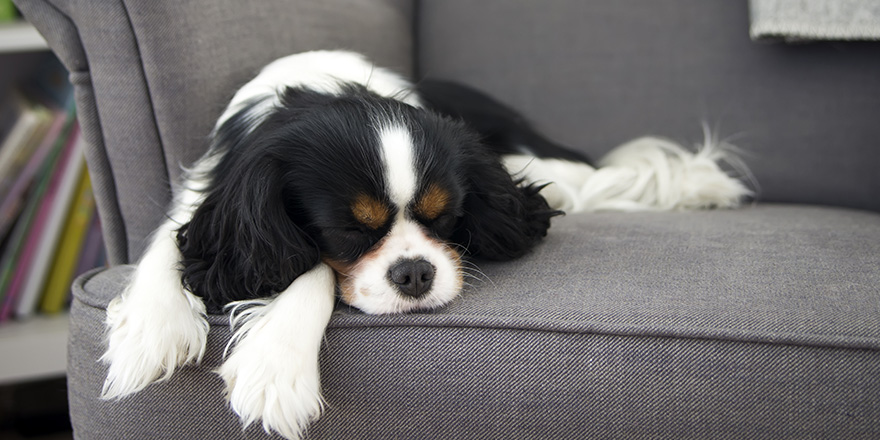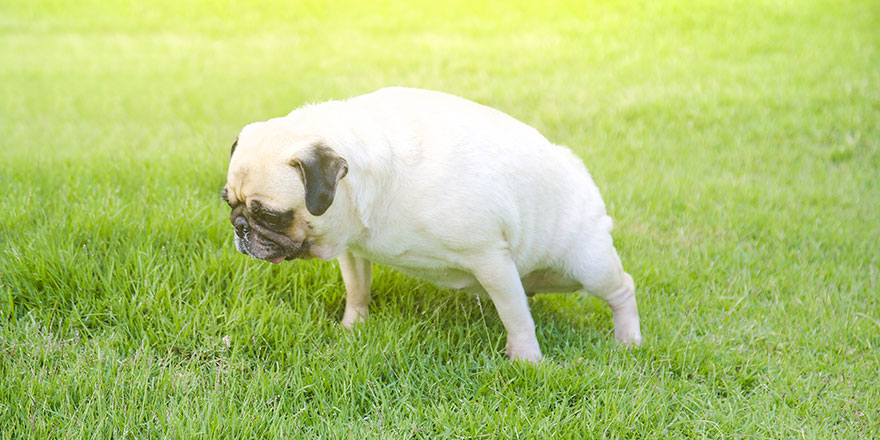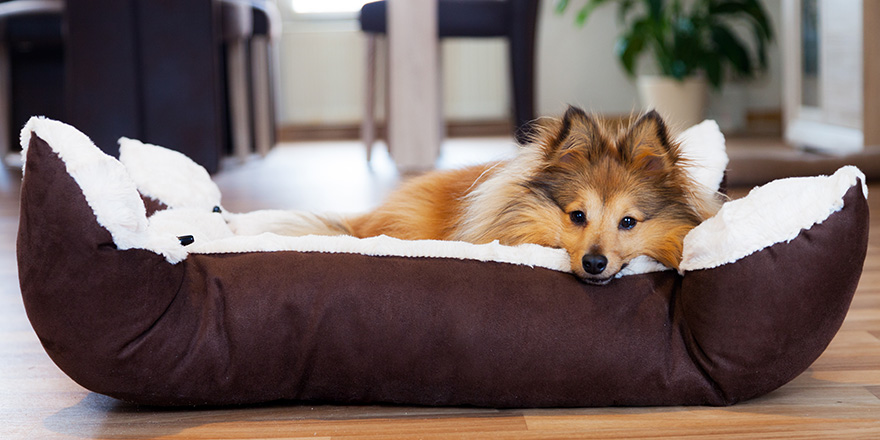It could be a urinary tract infection or something more sinister. Your dog may just be hitting that part of their life where they don’t have great bladder control, or they might have bladder stones. There are a fair few reasons why your pup is peeing in their sleep, and not all of them are innocent or easy to sort out. In this guide, we look at the dog peeing during sleep hours and why it happens.
Key Takeaways
- Female and males dogs can suffer from urinary issues.
- Female dogs are more likely to have urinary incontinence after being spayed.
- A dog with diabetes will drink and pee excessively.
- Peeing in sleep may mean there’s a medical problem.
- Older dogs often have urinary/bladder problems.
Is Your Dog Peeing While Sleeping?

Have a dog peeing during sleep hours? It may seem strange to you, but it’s more common than you might think. If you have a dog urinating while lying down and asleep, there could be an underlying problem that needs to be checked out.
First, you need to be sure that your dog pees while asleep, and they aren’t just using their dog bed as a litter tray because they need to go out in the middle of the night. You can check this by setting up an in-home pet camera and watching the footage the next time you notice a dog pee puddle where your pup sleeps.
There are reasons for female and male dogs to pee in their sleep, so pet parents shouldn’t rule out any issues, to begin with.
Reasons Your Dog is Peeing in His Sleep
- Lack of potty training means that your dog pees in sleep, or whenever they need to, because they don’t recognize what to do when they need to go.
- Excessive thirst can lead to excessive urination, which may occur during sleep. In addition, be aware that excessive thirst can signify diabetes.
- Dogs suffering from a urinary tract problem will often have urine leakage without realizing it.
- Frequent UTIs or Urinary Tract Infections can cause loss of bladder control.
- Damage to the kidney, kidney disease, or kidney failure.
- A congenital disability that has caused damage to normal bladder function may cause your dog to start peeing in his sleep.
- Injury or damage to the bladder.
- A weak bladder.
- Hormonal imbalances.
- Issues with your dog’s diet.
- Depending on their size, kidney or urinary stones may or may not require surgical removal.
Please note that many of these causes of nighttime urination can happen to a male dog or a female dog.
Urinary Incontinence in Female Dogs
The most common form of urinary incontinence in female dogs is spay incontinence. This is the inability to control the bladder and/or bowels after being spayed. It may happen straight away, but some spayed female dogs often have trouble peeing in their elder years after being spayed. It’s more common when dogs are spayed as adults instead of puppies or if there are complications during the procedure.
Urethral incontinence is diagnosed from clinical signs, blood tests, urine tests, and the medical history of the dog in question. The most common sign is urine pooling underneath your dog while she is relaxed, but you may also see leaking urine from your dog when she is walking around. In addition, dog owners with female dogs that have suspected urethral incontinence will often find urine underneath their dog’s bedding or in other places she likes to lie down.
Neutered males can have similar issues, but it’s more likely for a female dog to suffer from urinary incontinence after neutering. It would be rare for a neutered male dog to have difficulty urinating simply because their procedure doesn’t involve an invasive operation.
Bladder storage dysfunction is another issue that can be part of urinary incontinence in dogs. As you may have guessed, this condition refers to a dog’s inability to store an appropriate amount of urine in their bladder, which can lead to leaking urine. Again, it can be traced back to other underlying issues, such as weakened muscles.
Why Does Urinary Incontinence Occur During Sleep?
Urinary incontinence is a condition where a dog loses control of their bladder. For example, when a dog relaxes or goes to sleep, their muscles relax, too. That means that the bladder neck, which is responsible for retraining urine within the bladder, loosens, and urine escapes through the urethra.
During sleep, dogs experience peeing like this because their muscle tone has been reduced and isn’t strong enough to keep urine inside anymore. As a medical condition, this type of incontinence has several causes:
- Old age
- Damaged bladder muscles
- Spinal injuries
- Post-surgery complications
- Neutering
For older female dogs that experience loss of bladder control, the reason comes down to lack of the hormones estrogen and progesterone. After being spayed, female dogs have fewer of these homes, which are part of the strength of the muscles that keep urine inside a female dog’s bladder. Without higher levels of the hormones, the muscles are weaker than they would be in a non-neutered female dog.
Many dog owners believe that the possibility of incontinence is a reason not to neuter their dogs. Still, only 5% of spayed female dogs will develop the condition after their operation, and it can take months or years for the condition to show up.
Spaying your dog has many more benefits than downfalls. You can help reduce the risk of urinary tract infections, help prevent breast and ovarian cancer, and stop unwanted hormonal behaviors such as spraying and other heat-related issues.
Could There Be a Neurological Cause?
Unfortunately, yes. Any disruption of the nerves controlling the bladder can cause your dog to pee unexpectedly while they’re sleeping or relaxed. Furthermore, some brain diseases or lesions can include urethral incontinence as a symptom, as can spinal injuries and spinal cord disease.
Urinary Tract Infections

The most common kind of UTI in dogs is a bacterial UTI. They affect 14% of all dogs throughout their lifetime and can become incredibly problematic if not treated correctly.
The top treatment for a UTI is antibiotics, but they don’t always work – depending on the severity of the infection. The longer an infection goes untreated, the more serious it becomes. For example, a urinary tract infection can become a kidney infection if left long enough. And it’s not just dogs that suffer from them, either! This is a very common condition in humans, especially women.
How Does a Dog Get a Urinary Tract Infection?
A urinary tract infection occurs when bacteria enter a dog’s urethra. The bacteria can come from several places and may even be the result of a dog cleaning their pelvic area or not cleaning up properly after having a bowel movement.
UTI Symptoms
- Frequent urination
- Pain when urinating
- Bloody or cloudy urine
- Excessive licking
- Fever
A urinary tract infection will not go away by itself. It needs medical intervention to be cured.
Ectopic Ureters
Ectopic ureters are ureters that are not anatomically correct. For example, they may be in the wrong location due to a congenital disability or an issue during a surgical procedure. Urethral hypoplasia is one of the abnormalities associated with this condition, and it can cause urethral incontinence.
Ultimately, your dog may experience urine retention, which will result from stress or other negative feelings, leading to urine build-up and loss of bladder control. Dogs in pain or discomfort will either hold their urine or let it go. However, holding it in can cause more harm, and doing this frequently may weaken your pet’s muscles.
New pet owners should know that ectopic ureters are more common in female Labrador Retrievers, Siberian Huskies, Golden Retrievers, and Wheaten Terriers.
What to do if Your Dog is Peeing in Their Sleep
After gaining evidence that your dog is peeing while unconscious, the first thing you want to do is see if it happens again. After all, it could just be a one-time thing that isn’t anything to worry about, and there’s no point getting an expensive vet bill for that.
Once you’re sure your dog’s peeling, it’s time to take responsibility as a dog owner and get them to a vet for a diagnosis and possible medical treatment. Dogs peeing in their sleep isn’t always serious, but there are so many causes that it’s better for dog owners to get their pup checked out.
Your vet will run some tests to determine why your dog is peeing abnormally. These may include blood tests, a urine sample, or even a stool test. Your vet will also ask about your dog’s recent diet habits and give them an examination.
Serious Warning Signs
- Bloody urine
- Refusal to drink
- Extremely dark-colored urine
- Urine leakage while walking around
- Continuous bladder infections
Any of these symptoms should be a ticket to a vet appointment.
Medical Therapy for Your Adult Dog
There are medications for incontinence relief that your dog may benefit from if peeing in their sleep. Your vet may suggest one, or you can buy a range of supplements and medications online that are advertised to help dogs with this problem.
Always consult your vet before giving your dog any new medication or supplement.
It should be noted that, at present, there are no prescription drugs that can cure incontinence, but there may be drugs or a prescription diet that can ease the symptoms that your dog is experiencing.
In terms of surgery, your dog may be eligible, depending on the reason behind their incontinence. Besides, it’s possible to put your dog through a type of physical therapy that increases muscle tone and reduces accidental peeing. Please speak to your vet about your dog’s options and ask them to help you understand what is causing your dog’s inability to control their bladder in their sleep.
How to Help a Young Dog Peeing in Sleep

Got a puppy peeing in sleep or relaxation? With puppies, it’s more likely that they haven’t developed their bladder control yet and don’t realize that they need to get up and go to the bathroom to pee.
The best thing dog owners can do with puppies peeing in their sleep is to further their potty training. Potty training is crucial in raising a puppy because they need to know when they can and can’t pee. For now, start with buying some supplies – puppy pee pads (to absorb the pee from any accidents) and treats for rewards after they’ve made progress during training.
Potty or house training your dog isn’t as hard as it seems. Puppies have very small bladders and can only hold their pee for around two hours. Therefore, you should be taking your little friend outside every two hours to help them start a routine.
Pick a spot outside that your dog can begin to recognize as a safe place to pee, and reward them whenever they eliminate their bowels or bladder outside.
Keep them on a regular feeding schedule and provide fresh water each day.
Medical Disclaimer
The contents of the www.mypetneedsthat.com website, such as text, graphics, images, and other material contained on this site (“Content”) are for informational purposes only. The Content is not intended to be a substitute for professional veterinarian advice, diagnosis, or treatment. Always seek the advice of your veterinarian with any questions you may have regarding the medical condition of your pet. Never disregard professional advice or delay in seeking it because of something you have read on this website.
FAQs:
Dogs can pee while sleeping, and they certainly won't know that they're doing it. We've outlined a number of reasons for this in our guide above, but you should certainly take your pup to the vet if you suspect that something may be wrong.
A few drops of urine on a non-regular basis shouldn't concern you. Sometimes our pets just don't quite make it to the bathroom on time or they don't realize how full their bladder is and leak urine. If your dog is frequently experiencing leaks when sleep occurs, then you should be concerned.
Yes and no. Your small pup needs to pee the regular amount but take into account that they have a smaller bladder. It may seem like they need to pee more frequently because of this, but they're doing fine. If your dog is urinating more than they usually do, consider having them checked for a urinary tract infection.







